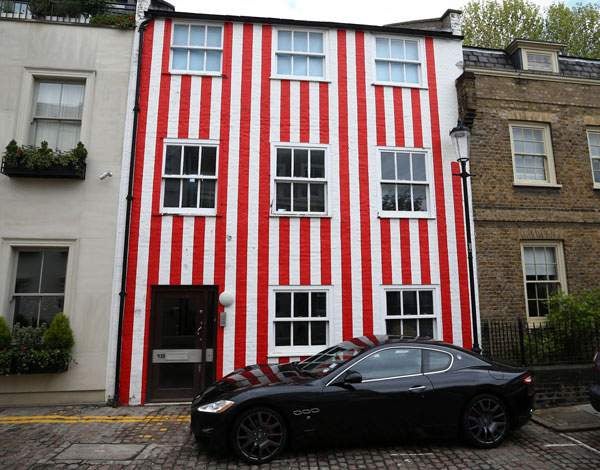
There is a great history of English eccentrics irritating the locals, says Clive Aslet, thinking on the Kensington beach-hut house

I was in Sri Lanka when I read about the beach hut house. You know the one: it’s part of a terrace in Kensington whose owner, according to probably unreliable newspaper reports, was so exasperated by her neighbours’ objections to her desire to create a couple of basements under her house and its garden that she raised a decorative two fingers and painted the outside of her home in broad stripes.
The result resembles a deckchair, folded and propped against a wall. A very large deckchair. The raspberry that this blows in the direction of neighbours, the Kensington and Chelsea planning office and the world at large is practically deafening. Loud enough for me to hear it, figuratively speaking, in Colombo.
I rather doubt that the neighbours were the obstacle, though. Iceberg houses, as they’re popularly called — from the fact that there’s more of them below ground than above — have been outlawed, in Kensington and Chelsea, by the ruling that new basements and sub-basements can’t extend beneath gardens. Obviously that puts the kibosh on a big swimming pool — all that will be possible in future will be a glorified hip bath, while the cinema room will shrink to the size of a cabin.
I’m with the council on this one. There’s nothing more infuriating to the owner of a pleasant house, in a secluded street, than to find a new neighbour is going to make the next few years of his life hell by quarrying operations. Which is made worse to the traditional householder by the knowledge that the arrival next door probably won’t live in the house for more than a few weeks a year anyway.
And yet I can see the other side of the argument, too. Iceberg houses are actually what the super-rich want. I don’t mean they all hate the daylight and are happy to gloat over their collections of serious cars and big art in underground silos — although, come to think of it, gloating may be a popular activity in some quarters. No, only that the idea of ‘conspicuous consumption’, formulated by the economist Thorstein Veblen in 1899, has been turned on its head. Once again we have an elite who are as rich as — possibly richer than — the plutocracy about whom Veblen wrote in his Theory of the Leisure Class.
But one of the differences is conveyed in the word ‘swagger’. John Singer Sargent caught them doing it in his swagger portraits. They swaggered in their neo-Baroque public buildings, in their Mr Toad motorcars, in their opulent hotels and on ocean liners. They swaggered around the Empire like anything. Swagger is now out of fashion. The really, really rich don’t do bling.
But swagger hasn’t entirely disappeared, if part of the point of swagger is to aggravate others. There’s also that other priceless entertainment for those who aren’t party to it: a good row between neighbours. This isn’t an exclusively British thing: the most irritating neighbour we’ve had was French. (Like New Yorkers, Parisians, after generations of apartment living, complain. The British prefer to seethe inwardly.) But we’re quick to take umbrage over infringements to property. Disputes over leylandii hedges can lead to murder. Which I regard — and I’m sorry to be snobbish — as evidence of a suburban mentality.
There are much more amusing ways of tormenting the neighbours. As a child, I visited a Guy Fawkes party during which the father was trying to angle the rockets so that they’d go through the next-door windows. ‘I can just see one of them open,’ he said with a wink. On a rather grander scale, Thomas Wentworth got his own back on his cousin Thomas Watson in the 1690s. Not having been left Wentworth Woodhouse as he expected, he built a mock castle on a nearby hill; he called it Wentworth Castle.
Nancy Mitford would have called this a ‘neighbour tease’. The word ‘tease,’ to the Mitfords, contained a hint of cruelty. Perhaps not, though, to Lord Berners, with whom they shared many giggles. His flamboyant goings-on at Faringdon House, in the dreamy landscape of the Berkshire Thames, famously included dyeing his doves lively colours — a piece of foppishness that made other landowners, most of whom were of a military persuasion, froth with rage. That sort of tease requires both style and a dovecote.
A more affordable alternative is suggested by a friend who, on moving to a country village, changed the name of his cottage to Bowel Movement. The residents of polite Kensington and Chelsea would probably prefer beach hut stripes.








